BMP4002 Business Law: UK Business Organizations & Sources of Law
VerifiedAdded on 2023/06/06
|8
|2484
|283
Report
AI Summary
This report provides an overview of the legal framework for business organizations in the UK, focusing on key sources of law such as the Company Law 2006 and relevant acts like the Corporate and Governance Act 2020 and the Insolvency Act 1986. It examines different types of business structures, including sole proprietorships, general partnerships, limited liability partnerships (LLP), and limited liability companies (LLC), highlighting their respective advantages and disadvantages concerning liability, taxation, and operational complexity. The report also discusses the duties and liabilities of company directors, the process of partnership termination, and the significance of the memorandum and articles of association. It concludes with a recommendation for IOM Solutions, currently operating as a sole trader, to transition to a Limited Liability Partnership to leverage its benefits in terms of liability protection, credibility, and potential for growth, emphasizing the importance of establishing a separate legal identity for the business. Desklib offers a wealth of resources, including past papers and solved assignments, to aid students in their understanding of business law.
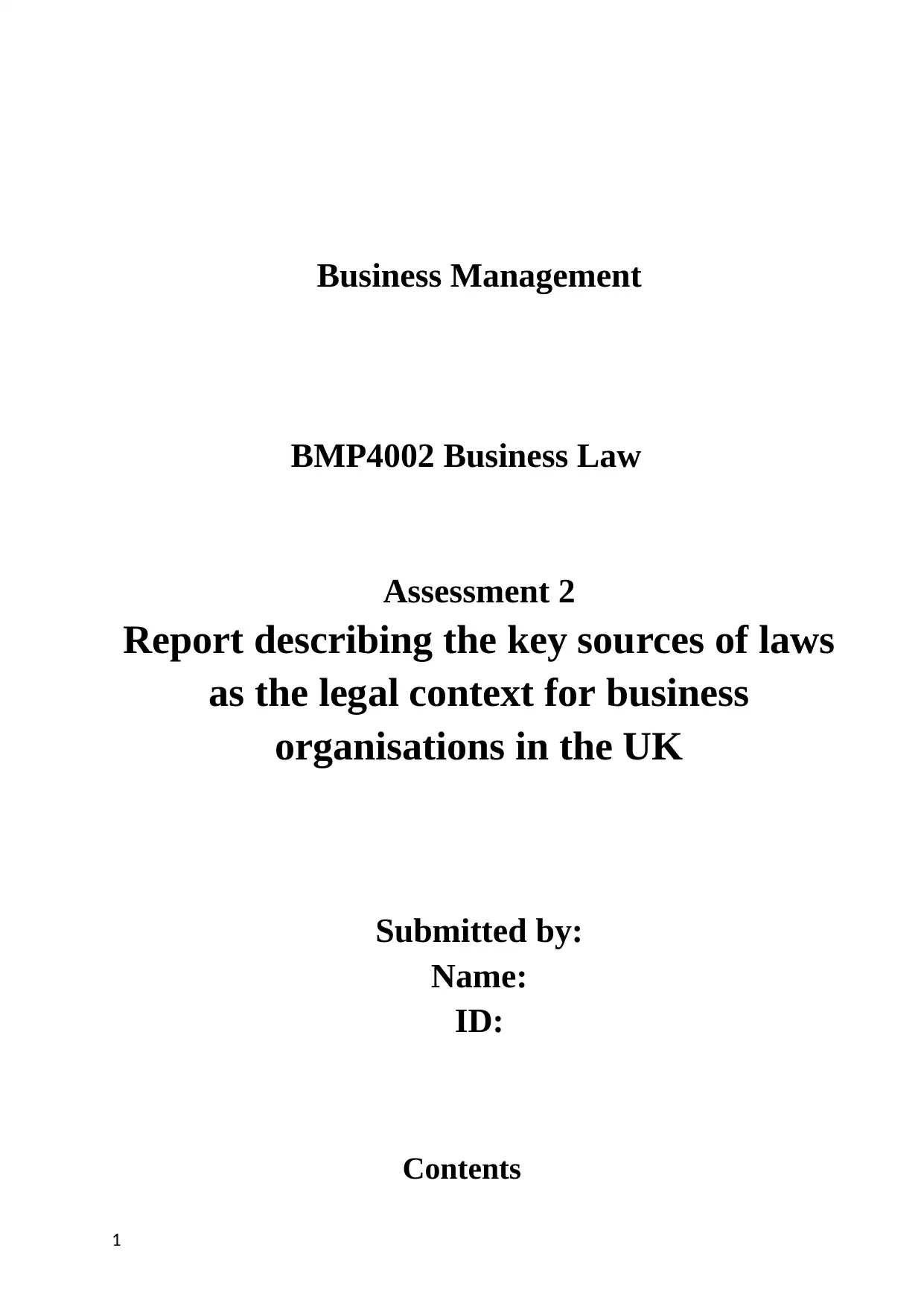
Business Management
BMP4002 Business Law
Assessment 2
Report describing the key sources of laws
as the legal context for business
organisations in the UK
Submitted by:
Name:
ID:
Contents
1
BMP4002 Business Law
Assessment 2
Report describing the key sources of laws
as the legal context for business
organisations in the UK
Submitted by:
Name:
ID:
Contents
1
Paraphrase This Document
Need a fresh take? Get an instant paraphrase of this document with our AI Paraphraser
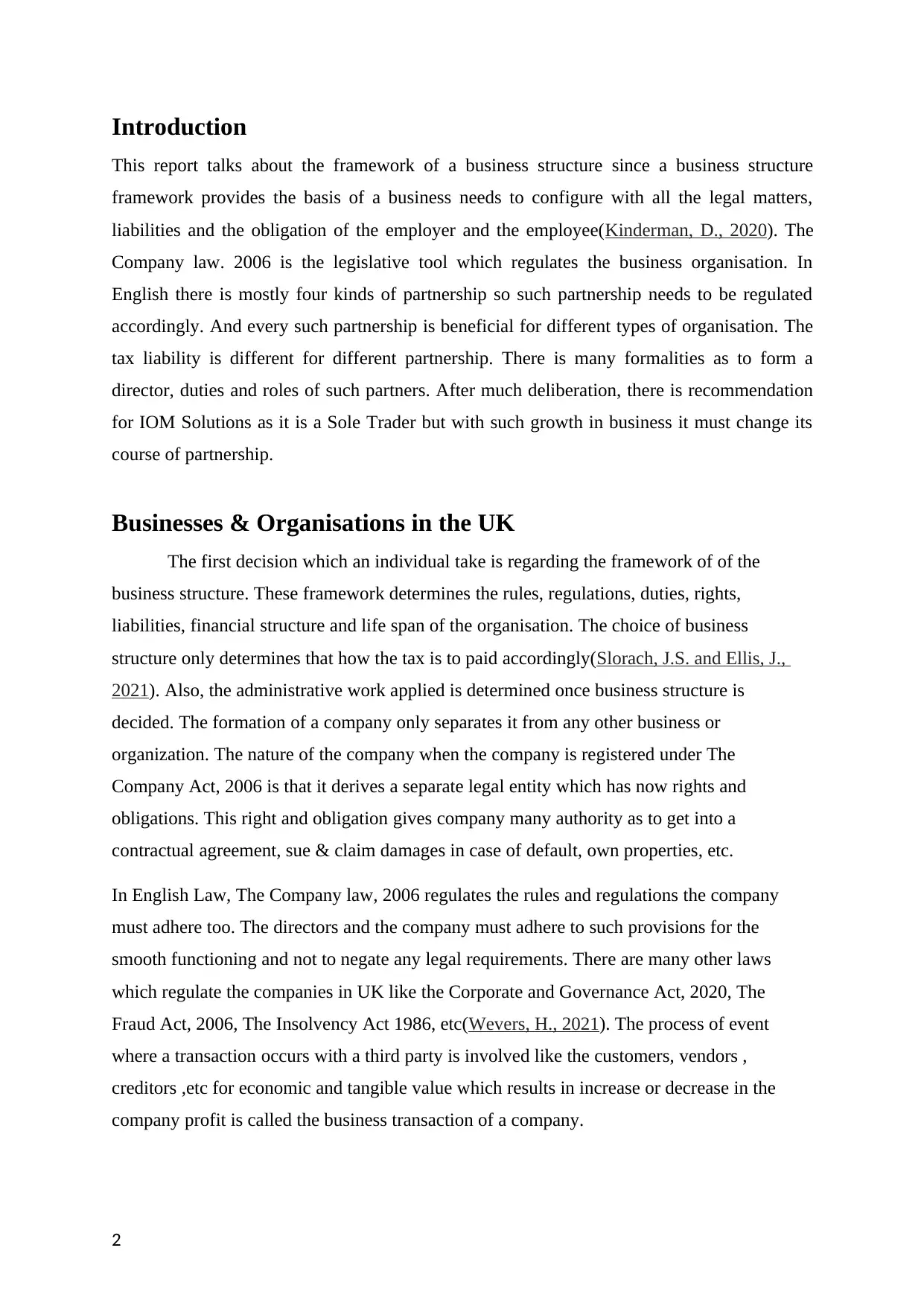
Introduction
This report talks about the framework of a business structure since a business structure
framework provides the basis of a business needs to configure with all the legal matters,
liabilities and the obligation of the employer and the employee(Kinderman, D., 2020). The
Company law. 2006 is the legislative tool which regulates the business organisation. In
English there is mostly four kinds of partnership so such partnership needs to be regulated
accordingly. And every such partnership is beneficial for different types of organisation. The
tax liability is different for different partnership. There is many formalities as to form a
director, duties and roles of such partners. After much deliberation, there is recommendation
for IOM Solutions as it is a Sole Trader but with such growth in business it must change its
course of partnership.
Businesses & Organisations in the UK
The first decision which an individual take is regarding the framework of of the
business structure. These framework determines the rules, regulations, duties, rights,
liabilities, financial structure and life span of the organisation. The choice of business
structure only determines that how the tax is to paid accordingly(Slorach, J.S. and Ellis, J.,
2021). Also, the administrative work applied is determined once business structure is
decided. The formation of a company only separates it from any other business or
organization. The nature of the company when the company is registered under The
Company Act, 2006 is that it derives a separate legal entity which has now rights and
obligations. This right and obligation gives company many authority as to get into a
contractual agreement, sue & claim damages in case of default, own properties, etc.
In English Law, The Company law, 2006 regulates the rules and regulations the company
must adhere too. The directors and the company must adhere to such provisions for the
smooth functioning and not to negate any legal requirements. There are many other laws
which regulate the companies in UK like the Corporate and Governance Act, 2020, The
Fraud Act, 2006, The Insolvency Act 1986, etc(Wevers, H., 2021). The process of event
where a transaction occurs with a third party is involved like the customers, vendors ,
creditors ,etc for economic and tangible value which results in increase or decrease in the
company profit is called the business transaction of a company.
2
This report talks about the framework of a business structure since a business structure
framework provides the basis of a business needs to configure with all the legal matters,
liabilities and the obligation of the employer and the employee(Kinderman, D., 2020). The
Company law. 2006 is the legislative tool which regulates the business organisation. In
English there is mostly four kinds of partnership so such partnership needs to be regulated
accordingly. And every such partnership is beneficial for different types of organisation. The
tax liability is different for different partnership. There is many formalities as to form a
director, duties and roles of such partners. After much deliberation, there is recommendation
for IOM Solutions as it is a Sole Trader but with such growth in business it must change its
course of partnership.
Businesses & Organisations in the UK
The first decision which an individual take is regarding the framework of of the
business structure. These framework determines the rules, regulations, duties, rights,
liabilities, financial structure and life span of the organisation. The choice of business
structure only determines that how the tax is to paid accordingly(Slorach, J.S. and Ellis, J.,
2021). Also, the administrative work applied is determined once business structure is
decided. The formation of a company only separates it from any other business or
organization. The nature of the company when the company is registered under The
Company Act, 2006 is that it derives a separate legal entity which has now rights and
obligations. This right and obligation gives company many authority as to get into a
contractual agreement, sue & claim damages in case of default, own properties, etc.
In English Law, The Company law, 2006 regulates the rules and regulations the company
must adhere too. The directors and the company must adhere to such provisions for the
smooth functioning and not to negate any legal requirements. There are many other laws
which regulate the companies in UK like the Corporate and Governance Act, 2020, The
Fraud Act, 2006, The Insolvency Act 1986, etc(Wevers, H., 2021). The process of event
where a transaction occurs with a third party is involved like the customers, vendors ,
creditors ,etc for economic and tangible value which results in increase or decrease in the
company profit is called the business transaction of a company.
2
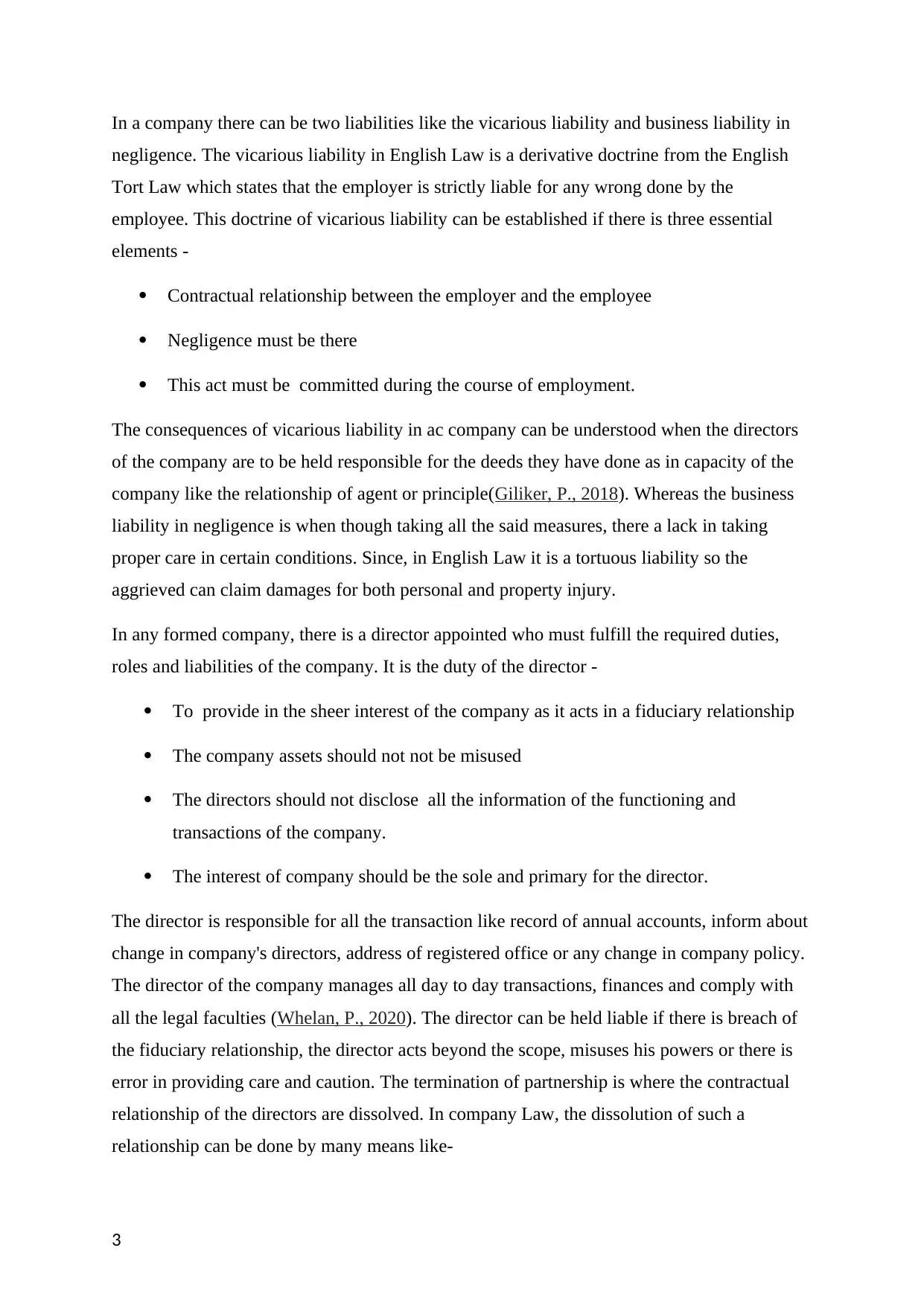
In a company there can be two liabilities like the vicarious liability and business liability in
negligence. The vicarious liability in English Law is a derivative doctrine from the English
Tort Law which states that the employer is strictly liable for any wrong done by the
employee. This doctrine of vicarious liability can be established if there is three essential
elements -
Contractual relationship between the employer and the employee
Negligence must be there
This act must be committed during the course of employment.
The consequences of vicarious liability in ac company can be understood when the directors
of the company are to be held responsible for the deeds they have done as in capacity of the
company like the relationship of agent or principle(Giliker, P., 2018). Whereas the business
liability in negligence is when though taking all the said measures, there a lack in taking
proper care in certain conditions. Since, in English Law it is a tortuous liability so the
aggrieved can claim damages for both personal and property injury.
In any formed company, there is a director appointed who must fulfill the required duties,
roles and liabilities of the company. It is the duty of the director -
To provide in the sheer interest of the company as it acts in a fiduciary relationship
The company assets should not not be misused
The directors should not disclose all the information of the functioning and
transactions of the company.
The interest of company should be the sole and primary for the director.
The director is responsible for all the transaction like record of annual accounts, inform about
change in company's directors, address of registered office or any change in company policy.
The director of the company manages all day to day transactions, finances and comply with
all the legal faculties (Whelan, P., 2020). The director can be held liable if there is breach of
the fiduciary relationship, the director acts beyond the scope, misuses his powers or there is
error in providing care and caution. The termination of partnership is where the contractual
relationship of the directors are dissolved. In company Law, the dissolution of such a
relationship can be done by many means like-
3
negligence. The vicarious liability in English Law is a derivative doctrine from the English
Tort Law which states that the employer is strictly liable for any wrong done by the
employee. This doctrine of vicarious liability can be established if there is three essential
elements -
Contractual relationship between the employer and the employee
Negligence must be there
This act must be committed during the course of employment.
The consequences of vicarious liability in ac company can be understood when the directors
of the company are to be held responsible for the deeds they have done as in capacity of the
company like the relationship of agent or principle(Giliker, P., 2018). Whereas the business
liability in negligence is when though taking all the said measures, there a lack in taking
proper care in certain conditions. Since, in English Law it is a tortuous liability so the
aggrieved can claim damages for both personal and property injury.
In any formed company, there is a director appointed who must fulfill the required duties,
roles and liabilities of the company. It is the duty of the director -
To provide in the sheer interest of the company as it acts in a fiduciary relationship
The company assets should not not be misused
The directors should not disclose all the information of the functioning and
transactions of the company.
The interest of company should be the sole and primary for the director.
The director is responsible for all the transaction like record of annual accounts, inform about
change in company's directors, address of registered office or any change in company policy.
The director of the company manages all day to day transactions, finances and comply with
all the legal faculties (Whelan, P., 2020). The director can be held liable if there is breach of
the fiduciary relationship, the director acts beyond the scope, misuses his powers or there is
error in providing care and caution. The termination of partnership is where the contractual
relationship of the directors are dissolved. In company Law, the dissolution of such a
relationship can be done by many means like-
3
⊘ This is a preview!⊘
Do you want full access?
Subscribe today to unlock all pages.

Trusted by 1+ million students worldwide
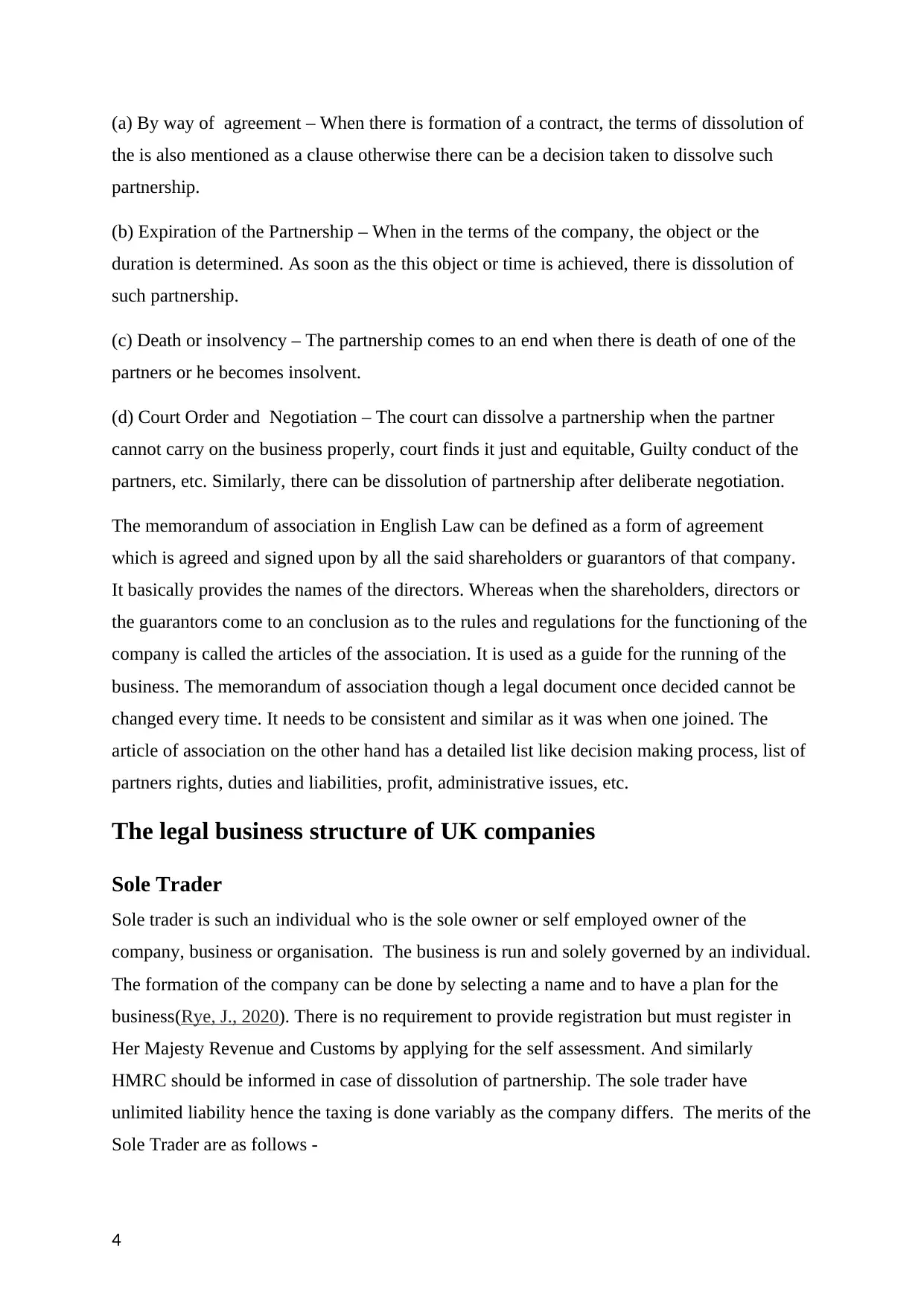
(a) By way of agreement – When there is formation of a contract, the terms of dissolution of
the is also mentioned as a clause otherwise there can be a decision taken to dissolve such
partnership.
(b) Expiration of the Partnership – When in the terms of the company, the object or the
duration is determined. As soon as the this object or time is achieved, there is dissolution of
such partnership.
(c) Death or insolvency – The partnership comes to an end when there is death of one of the
partners or he becomes insolvent.
(d) Court Order and Negotiation – The court can dissolve a partnership when the partner
cannot carry on the business properly, court finds it just and equitable, Guilty conduct of the
partners, etc. Similarly, there can be dissolution of partnership after deliberate negotiation.
The memorandum of association in English Law can be defined as a form of agreement
which is agreed and signed upon by all the said shareholders or guarantors of that company.
It basically provides the names of the directors. Whereas when the shareholders, directors or
the guarantors come to an conclusion as to the rules and regulations for the functioning of the
company is called the articles of the association. It is used as a guide for the running of the
business. The memorandum of association though a legal document once decided cannot be
changed every time. It needs to be consistent and similar as it was when one joined. The
article of association on the other hand has a detailed list like decision making process, list of
partners rights, duties and liabilities, profit, administrative issues, etc.
The legal business structure of UK companies
Sole Trader
Sole trader is such an individual who is the sole owner or self employed owner of the
company, business or organisation. The business is run and solely governed by an individual.
The formation of the company can be done by selecting a name and to have a plan for the
business(Rye, J., 2020). There is no requirement to provide registration but must register in
Her Majesty Revenue and Customs by applying for the self assessment. And similarly
HMRC should be informed in case of dissolution of partnership. The sole trader have
unlimited liability hence the taxing is done variably as the company differs. The merits of the
Sole Trader are as follows -
4
the is also mentioned as a clause otherwise there can be a decision taken to dissolve such
partnership.
(b) Expiration of the Partnership – When in the terms of the company, the object or the
duration is determined. As soon as the this object or time is achieved, there is dissolution of
such partnership.
(c) Death or insolvency – The partnership comes to an end when there is death of one of the
partners or he becomes insolvent.
(d) Court Order and Negotiation – The court can dissolve a partnership when the partner
cannot carry on the business properly, court finds it just and equitable, Guilty conduct of the
partners, etc. Similarly, there can be dissolution of partnership after deliberate negotiation.
The memorandum of association in English Law can be defined as a form of agreement
which is agreed and signed upon by all the said shareholders or guarantors of that company.
It basically provides the names of the directors. Whereas when the shareholders, directors or
the guarantors come to an conclusion as to the rules and regulations for the functioning of the
company is called the articles of the association. It is used as a guide for the running of the
business. The memorandum of association though a legal document once decided cannot be
changed every time. It needs to be consistent and similar as it was when one joined. The
article of association on the other hand has a detailed list like decision making process, list of
partners rights, duties and liabilities, profit, administrative issues, etc.
The legal business structure of UK companies
Sole Trader
Sole trader is such an individual who is the sole owner or self employed owner of the
company, business or organisation. The business is run and solely governed by an individual.
The formation of the company can be done by selecting a name and to have a plan for the
business(Rye, J., 2020). There is no requirement to provide registration but must register in
Her Majesty Revenue and Customs by applying for the self assessment. And similarly
HMRC should be informed in case of dissolution of partnership. The sole trader have
unlimited liability hence the taxing is done variably as the company differs. The merits of the
Sole Trader are as follows -
4
Paraphrase This Document
Need a fresh take? Get an instant paraphrase of this document with our AI Paraphraser
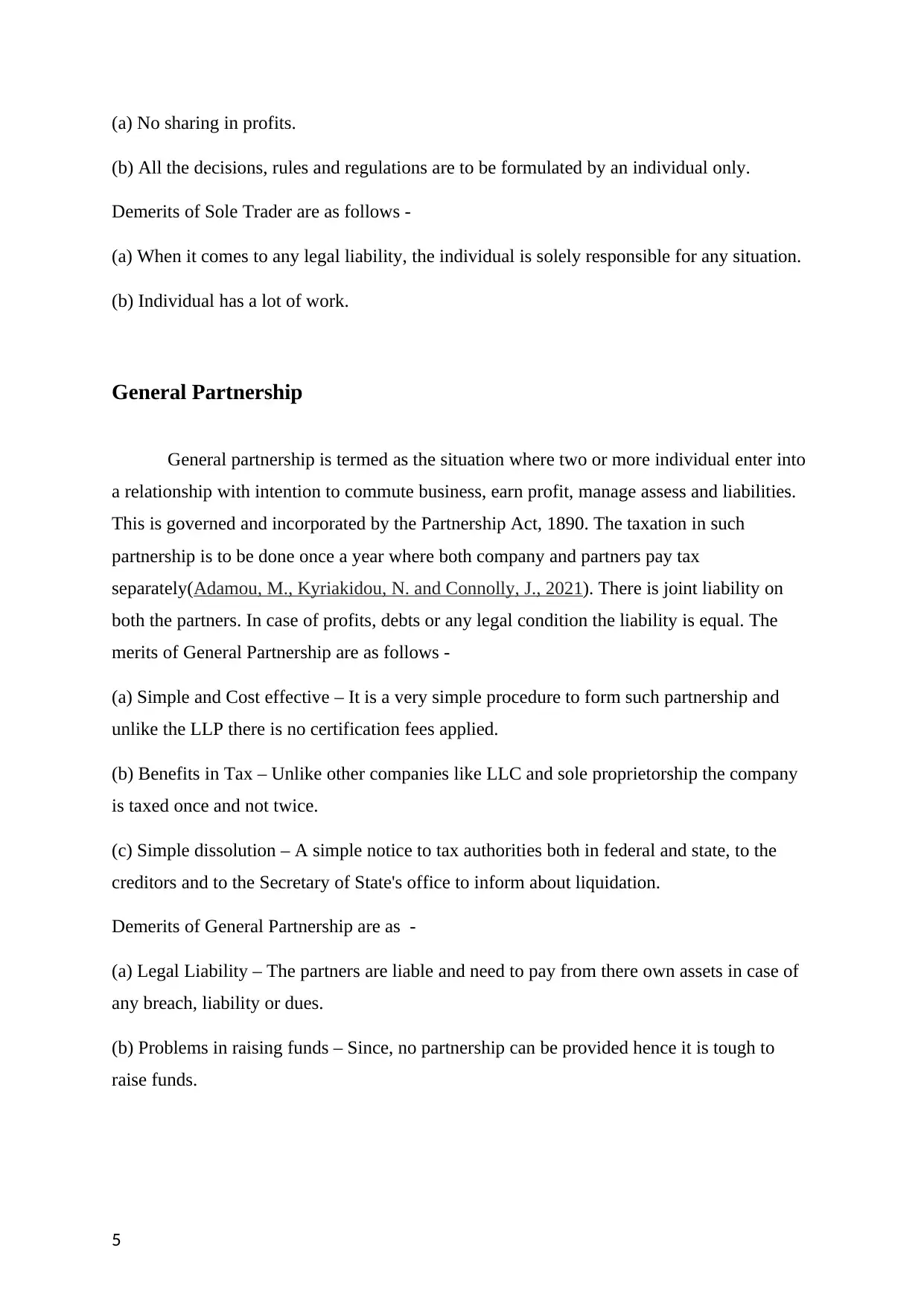
(a) No sharing in profits.
(b) All the decisions, rules and regulations are to be formulated by an individual only.
Demerits of Sole Trader are as follows -
(a) When it comes to any legal liability, the individual is solely responsible for any situation.
(b) Individual has a lot of work.
General Partnership
General partnership is termed as the situation where two or more individual enter into
a relationship with intention to commute business, earn profit, manage assess and liabilities.
This is governed and incorporated by the Partnership Act, 1890. The taxation in such
partnership is to be done once a year where both company and partners pay tax
separately(Adamou, M., Kyriakidou, N. and Connolly, J., 2021). There is joint liability on
both the partners. In case of profits, debts or any legal condition the liability is equal. The
merits of General Partnership are as follows -
(a) Simple and Cost effective – It is a very simple procedure to form such partnership and
unlike the LLP there is no certification fees applied.
(b) Benefits in Tax – Unlike other companies like LLC and sole proprietorship the company
is taxed once and not twice.
(c) Simple dissolution – A simple notice to tax authorities both in federal and state, to the
creditors and to the Secretary of State's office to inform about liquidation.
Demerits of General Partnership are as -
(a) Legal Liability – The partners are liable and need to pay from there own assets in case of
any breach, liability or dues.
(b) Problems in raising funds – Since, no partnership can be provided hence it is tough to
raise funds.
5
(b) All the decisions, rules and regulations are to be formulated by an individual only.
Demerits of Sole Trader are as follows -
(a) When it comes to any legal liability, the individual is solely responsible for any situation.
(b) Individual has a lot of work.
General Partnership
General partnership is termed as the situation where two or more individual enter into
a relationship with intention to commute business, earn profit, manage assess and liabilities.
This is governed and incorporated by the Partnership Act, 1890. The taxation in such
partnership is to be done once a year where both company and partners pay tax
separately(Adamou, M., Kyriakidou, N. and Connolly, J., 2021). There is joint liability on
both the partners. In case of profits, debts or any legal condition the liability is equal. The
merits of General Partnership are as follows -
(a) Simple and Cost effective – It is a very simple procedure to form such partnership and
unlike the LLP there is no certification fees applied.
(b) Benefits in Tax – Unlike other companies like LLC and sole proprietorship the company
is taxed once and not twice.
(c) Simple dissolution – A simple notice to tax authorities both in federal and state, to the
creditors and to the Secretary of State's office to inform about liquidation.
Demerits of General Partnership are as -
(a) Legal Liability – The partners are liable and need to pay from there own assets in case of
any breach, liability or dues.
(b) Problems in raising funds – Since, no partnership can be provided hence it is tough to
raise funds.
5
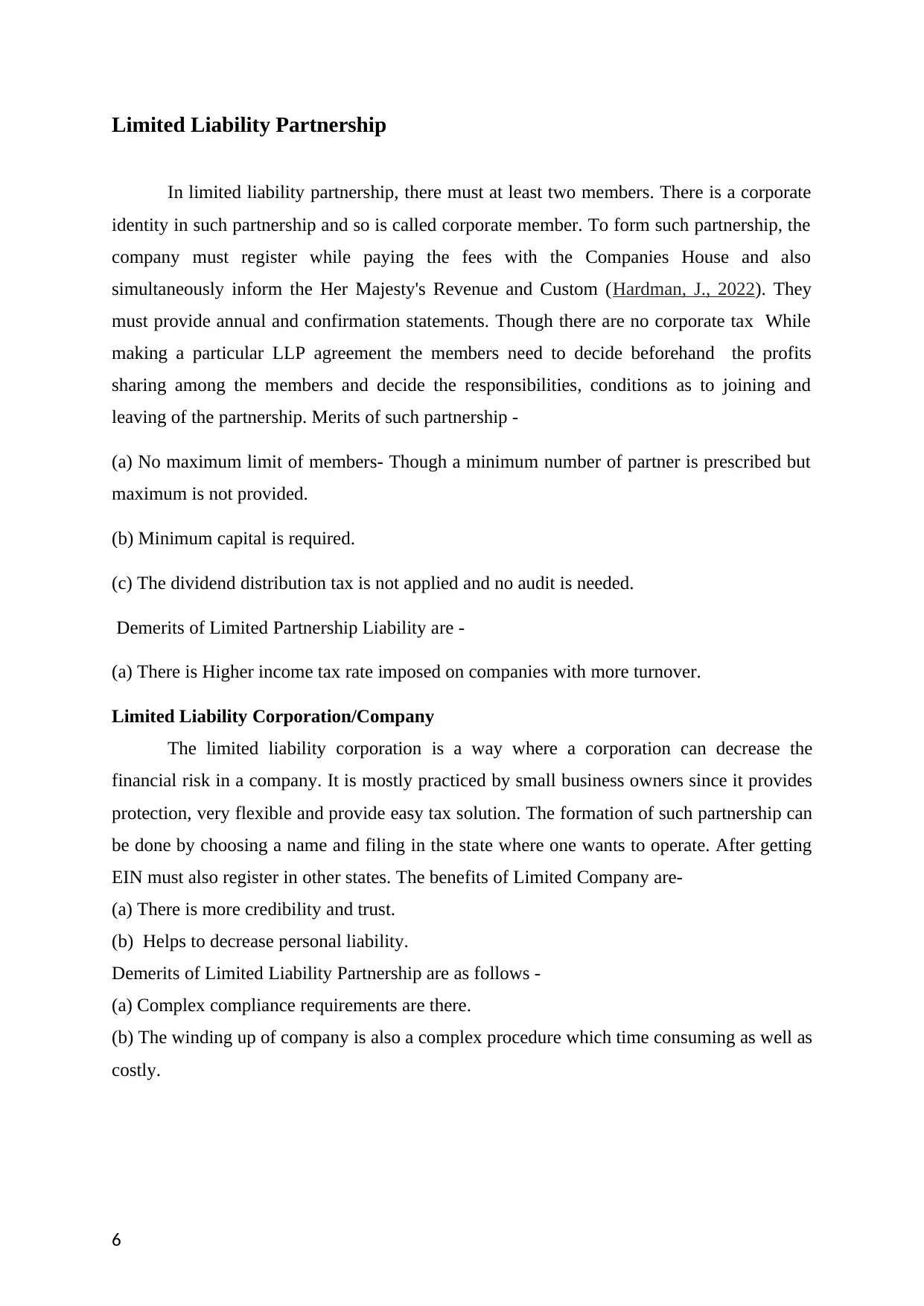
Limited Liability Partnership
In limited liability partnership, there must at least two members. There is a corporate
identity in such partnership and so is called corporate member. To form such partnership, the
company must register while paying the fees with the Companies House and also
simultaneously inform the Her Majesty's Revenue and Custom (Hardman, J., 2022). They
must provide annual and confirmation statements. Though there are no corporate tax While
making a particular LLP agreement the members need to decide beforehand the profits
sharing among the members and decide the responsibilities, conditions as to joining and
leaving of the partnership. Merits of such partnership -
(a) No maximum limit of members- Though a minimum number of partner is prescribed but
maximum is not provided.
(b) Minimum capital is required.
(c) The dividend distribution tax is not applied and no audit is needed.
Demerits of Limited Partnership Liability are -
(a) There is Higher income tax rate imposed on companies with more turnover.
Limited Liability Corporation/Company
The limited liability corporation is a way where a corporation can decrease the
financial risk in a company. It is mostly practiced by small business owners since it provides
protection, very flexible and provide easy tax solution. The formation of such partnership can
be done by choosing a name and filing in the state where one wants to operate. After getting
EIN must also register in other states. The benefits of Limited Company are-
(a) There is more credibility and trust.
(b) Helps to decrease personal liability.
Demerits of Limited Liability Partnership are as follows -
(a) Complex compliance requirements are there.
(b) The winding up of company is also a complex procedure which time consuming as well as
costly.
6
In limited liability partnership, there must at least two members. There is a corporate
identity in such partnership and so is called corporate member. To form such partnership, the
company must register while paying the fees with the Companies House and also
simultaneously inform the Her Majesty's Revenue and Custom (Hardman, J., 2022). They
must provide annual and confirmation statements. Though there are no corporate tax While
making a particular LLP agreement the members need to decide beforehand the profits
sharing among the members and decide the responsibilities, conditions as to joining and
leaving of the partnership. Merits of such partnership -
(a) No maximum limit of members- Though a minimum number of partner is prescribed but
maximum is not provided.
(b) Minimum capital is required.
(c) The dividend distribution tax is not applied and no audit is needed.
Demerits of Limited Partnership Liability are -
(a) There is Higher income tax rate imposed on companies with more turnover.
Limited Liability Corporation/Company
The limited liability corporation is a way where a corporation can decrease the
financial risk in a company. It is mostly practiced by small business owners since it provides
protection, very flexible and provide easy tax solution. The formation of such partnership can
be done by choosing a name and filing in the state where one wants to operate. After getting
EIN must also register in other states. The benefits of Limited Company are-
(a) There is more credibility and trust.
(b) Helps to decrease personal liability.
Demerits of Limited Liability Partnership are as follows -
(a) Complex compliance requirements are there.
(b) The winding up of company is also a complex procedure which time consuming as well as
costly.
6
⊘ This is a preview!⊘
Do you want full access?
Subscribe today to unlock all pages.

Trusted by 1+ million students worldwide
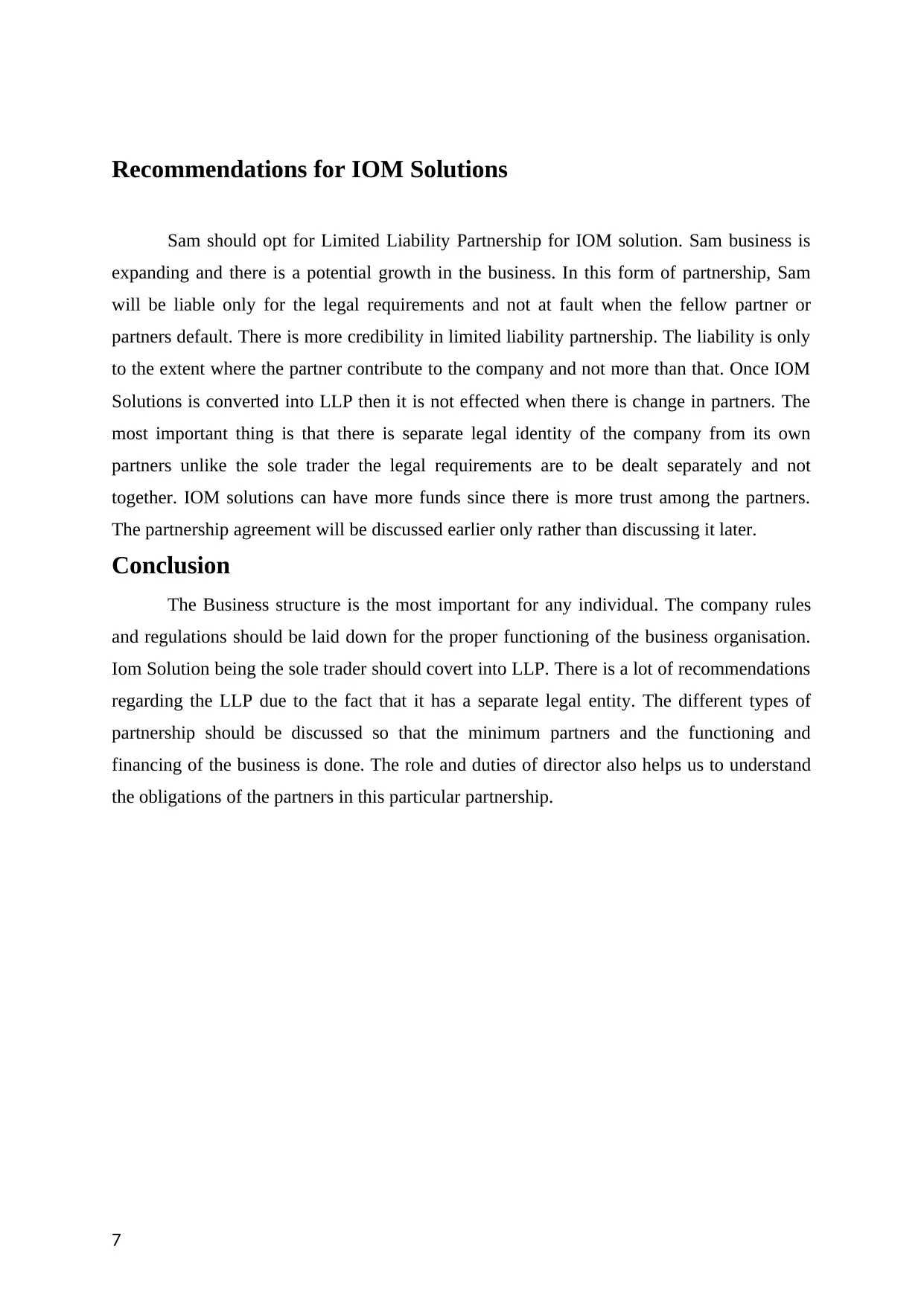
Recommendations for IOM Solutions
Sam should opt for Limited Liability Partnership for IOM solution. Sam business is
expanding and there is a potential growth in the business. In this form of partnership, Sam
will be liable only for the legal requirements and not at fault when the fellow partner or
partners default. There is more credibility in limited liability partnership. The liability is only
to the extent where the partner contribute to the company and not more than that. Once IOM
Solutions is converted into LLP then it is not effected when there is change in partners. The
most important thing is that there is separate legal identity of the company from its own
partners unlike the sole trader the legal requirements are to be dealt separately and not
together. IOM solutions can have more funds since there is more trust among the partners.
The partnership agreement will be discussed earlier only rather than discussing it later.
Conclusion
The Business structure is the most important for any individual. The company rules
and regulations should be laid down for the proper functioning of the business organisation.
Iom Solution being the sole trader should covert into LLP. There is a lot of recommendations
regarding the LLP due to the fact that it has a separate legal entity. The different types of
partnership should be discussed so that the minimum partners and the functioning and
financing of the business is done. The role and duties of director also helps us to understand
the obligations of the partners in this particular partnership.
7
Sam should opt for Limited Liability Partnership for IOM solution. Sam business is
expanding and there is a potential growth in the business. In this form of partnership, Sam
will be liable only for the legal requirements and not at fault when the fellow partner or
partners default. There is more credibility in limited liability partnership. The liability is only
to the extent where the partner contribute to the company and not more than that. Once IOM
Solutions is converted into LLP then it is not effected when there is change in partners. The
most important thing is that there is separate legal identity of the company from its own
partners unlike the sole trader the legal requirements are to be dealt separately and not
together. IOM solutions can have more funds since there is more trust among the partners.
The partnership agreement will be discussed earlier only rather than discussing it later.
Conclusion
The Business structure is the most important for any individual. The company rules
and regulations should be laid down for the proper functioning of the business organisation.
Iom Solution being the sole trader should covert into LLP. There is a lot of recommendations
regarding the LLP due to the fact that it has a separate legal entity. The different types of
partnership should be discussed so that the minimum partners and the functioning and
financing of the business is done. The role and duties of director also helps us to understand
the obligations of the partners in this particular partnership.
7
Paraphrase This Document
Need a fresh take? Get an instant paraphrase of this document with our AI Paraphraser
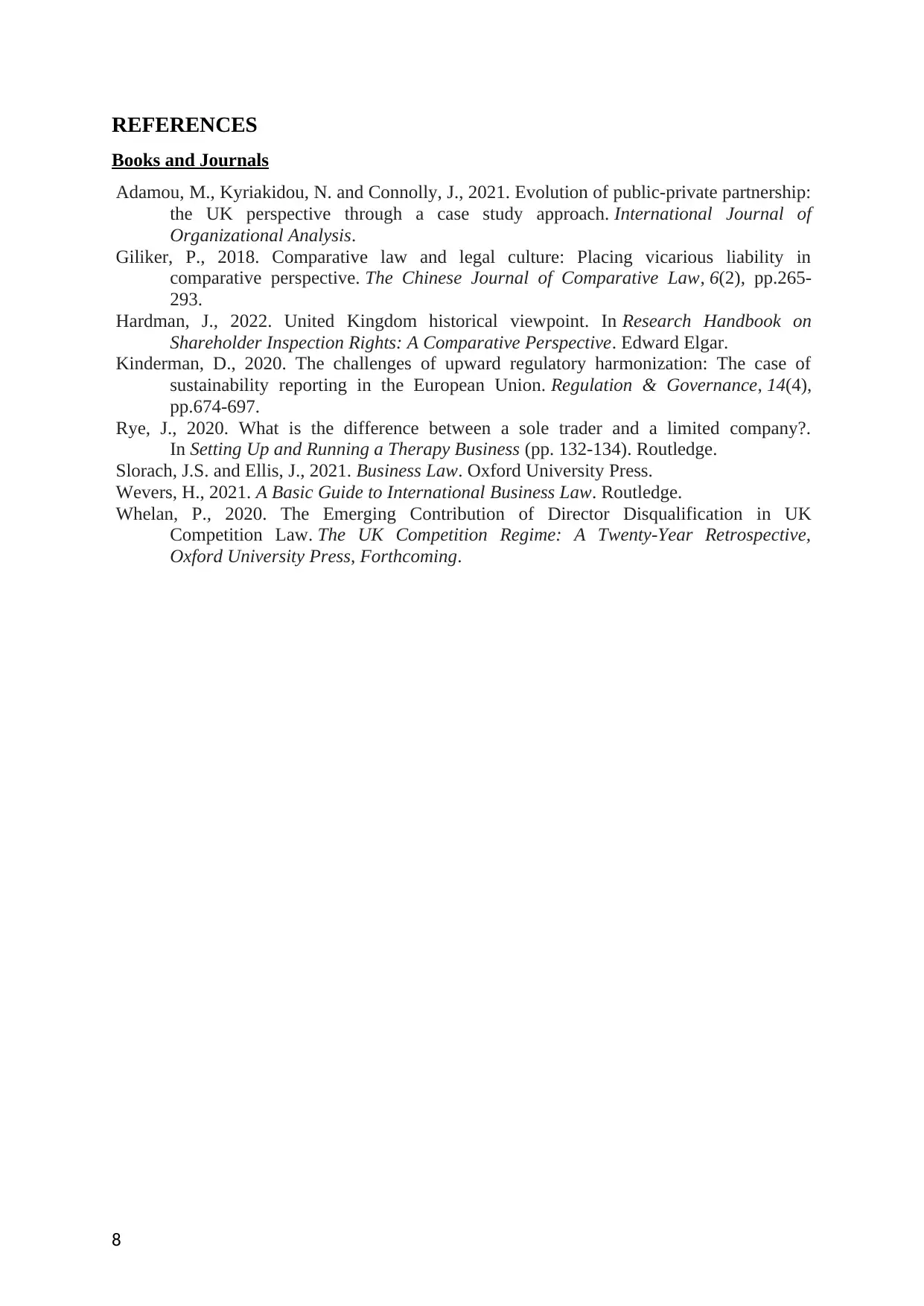
REFERENCES
Books and Journals
Adamou, M., Kyriakidou, N. and Connolly, J., 2021. Evolution of public-private partnership:
the UK perspective through a case study approach. International Journal of
Organizational Analysis.
Giliker, P., 2018. Comparative law and legal culture: Placing vicarious liability in
comparative perspective. The Chinese Journal of Comparative Law, 6(2), pp.265-
293.
Hardman, J., 2022. United Kingdom historical viewpoint. In Research Handbook on
Shareholder Inspection Rights: A Comparative Perspective. Edward Elgar.
Kinderman, D., 2020. The challenges of upward regulatory harmonization: The case of
sustainability reporting in the European Union. Regulation & Governance, 14(4),
pp.674-697.
Rye, J., 2020. What is the difference between a sole trader and a limited company?.
In Setting Up and Running a Therapy Business (pp. 132-134). Routledge.
Slorach, J.S. and Ellis, J., 2021. Business Law. Oxford University Press.
Wevers, H., 2021. A Basic Guide to International Business Law. Routledge.
Whelan, P., 2020. The Emerging Contribution of Director Disqualification in UK
Competition Law. The UK Competition Regime: A Twenty-Year Retrospective,
Oxford University Press, Forthcoming.
8
Books and Journals
Adamou, M., Kyriakidou, N. and Connolly, J., 2021. Evolution of public-private partnership:
the UK perspective through a case study approach. International Journal of
Organizational Analysis.
Giliker, P., 2018. Comparative law and legal culture: Placing vicarious liability in
comparative perspective. The Chinese Journal of Comparative Law, 6(2), pp.265-
293.
Hardman, J., 2022. United Kingdom historical viewpoint. In Research Handbook on
Shareholder Inspection Rights: A Comparative Perspective. Edward Elgar.
Kinderman, D., 2020. The challenges of upward regulatory harmonization: The case of
sustainability reporting in the European Union. Regulation & Governance, 14(4),
pp.674-697.
Rye, J., 2020. What is the difference between a sole trader and a limited company?.
In Setting Up and Running a Therapy Business (pp. 132-134). Routledge.
Slorach, J.S. and Ellis, J., 2021. Business Law. Oxford University Press.
Wevers, H., 2021. A Basic Guide to International Business Law. Routledge.
Whelan, P., 2020. The Emerging Contribution of Director Disqualification in UK
Competition Law. The UK Competition Regime: A Twenty-Year Retrospective,
Oxford University Press, Forthcoming.
8
1 out of 8
Related Documents
Your All-in-One AI-Powered Toolkit for Academic Success.
+13062052269
info@desklib.com
Available 24*7 on WhatsApp / Email
![[object Object]](/_next/static/media/star-bottom.7253800d.svg)
Unlock your academic potential
Copyright © 2020–2026 A2Z Services. All Rights Reserved. Developed and managed by ZUCOL.
